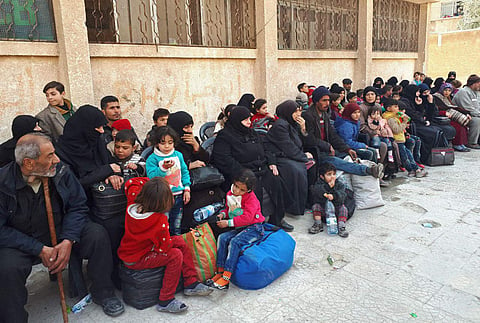

SYRIA: Hundreds more Syrian rebels and civilians prepared Friday to leave Eastern Ghouta under a negotiated withdrawal, as Russia unilaterally announced a similar deal to empty the final pocket of the battered enclave.
The former rebel bastion on the outskirts of Damascus has been drained by a nearly six-week Syrian government assault and two evacuation deals brokered by regime ally Moscow.
Under such agreements, rebels agree to hand over territory in exchange for safe passage for them and civilians to opposition-held northwest Syria.
More than 36,000 people have already been bussed out of the enclave, and fresh evacuations were under way on Friday.
Some 4,800 people, including fighters, were boarding buses in a pocket of Ghouta held by the Faylaq al-Rahman rebel faction, Syrian state media reported.
The agreement for that withdrawal, reached last week, left the overpopulated, devastated town of Douma as the final rebel holdout in the region.
Russia's defence ministry on Friday said it had brokered a deal that would see rebels abandon Douma "shortly", but the fighters there quickly denied it.
"We categorically refuse leaving or being displaced," said Jaish al-Islam's spokesman Hamza Bayraqdar.
"That's an essential demand of the negotiations. We have not reached an agreement yet," he told AFP, adding that talks were ongoing.
- Civilians hang in balance -
Civilians in Douma have become anxious over their uncertain fate.
"Jaish al-Islam is here and has to resolve the issue of civilians. We hope we can be done with this whole thing," said 39-year-old resident Mohammad al-Hussein.
"If they made me choose between leaving or staying, I'll stay. I didn't stay here for seven years just to leave in the end," he added.
Eastern Ghouta was the armed opposition's last stronghold around Damascus, which groups regularly targeted with rockets and mortar rounds.
To secure Damascus, President Bashar al-Assad launched a ferocious air and ground assault on February 18 to oust rebels from Ghouta.
The Syrian Observatory for Human Rights monitor says more than 1,600 civilians have been killed in the onslaught, which has overrun more than 90 percent of Ghouta.
Troops pursued a divide-and-conquer strategy, seizing most of the enclave then breaking up what was left of it into three isolated pockets.
Moscow stepped in and swiftly announced two withdrawal agreements with rebels, the first of which saw more than 4,500 fighters and civilians bussed out of the town of Harasta.
The second deal, reached with Faylaq al-Rahman one week ago, has seen over 31,000 people quit the towns of Arbin and Zamalka and the Jobar district.
In the first two deals, rebels caved in to Russia's "leave or die" approach but negotiations for the Douma pocket, held by Jaish al-Islam, look more arduous.
Douma's population has swelled to an estimated 200,000 with people displaced from other bombed-out districts.
Jaish al-Islam had been in talks with Russia to reach a settlement whereby they could stay, instead of being bused out like other rebels.
But negotiations faltered over the group's demands of a general amnesty and unrestricted movement for Douma residents across the country, a source with knowledge of the talks told AFP.
Moscow threatened Jaish al-Islam with a renewed blitz on the town if they did not agree to withdraw, and Syrian troops have amassed around the holdout.
- 'Above ground' -
On Thursday, Russia's foreign minister said rebel groups had "nearly been wiped out" by the government's offensive.
Syria's state news agency SANA said around 29,000 civilians had fled Douma in recent days, using a "corridor" opened up by advancing Syrian troops.
SANA said a total of 143,000 people in total had streamed out of Ghouta along such corridors and as part of the evacuation deals.
The state outlet did not confirm the agreement with Jaish al-Islam, but its correspondent said "preliminary information" indicated a deal was close.
Meanwhile, the Syrian Arab Red Crescent said Friday it was bringing humanitarian assistance to devastated Ghouta districts already recaptured by the regime.
Red Crescent workers distributed bread, water, and other aid to the towns of Kafr Batna, Saqba, and Ain Terma.
The rebels and civilians evacuated so far have been taken northwest to Idlib, where they could finally afford basic necessities after years under siege.
"The war we had was something unlike anything else in the world," said Abu Laameh, a 65-year-old evacuee who could finally afford a pack of cigarettes.
"It feels like we were at the bottom of a well, and someone pulled us out above ground."
But a departure to Idlib would be too "tricky" for Jaish al-Islam, said Thomas Pierret, an analyst at the National Center for Scientific Research in Paris.
"The problem with Jaish al-Islam is that it's quite big, very cohesive, very organised, but it doesn't go well with anyone else," Pierret told AFP.